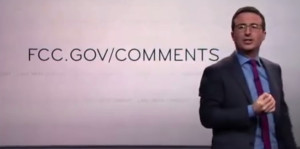 I am reading through the Federal Communications Commission’s comment proceeding on net neutrality, and am struck by how many posts make references to radio and other older technologies.
I am reading through the Federal Communications Commission’s comment proceeding on net neutrality, and am struck by how many posts make references to radio and other older technologies.
Here is one:
“I am sick of corporations being in charge of how I get information. You have already ruined radio and television. Do your job and keep the internet open for all. Work for the people for a change instead of money and power.”
And another:
“The internet has become almost impossible to use as it is. anyone with enough money is able to stick their nose into anything a person is trying to do. Pop Ups here, giggling to distract, Unwanted , unasked for butting in to show commercials. there is no end to it. MONEY talks, anything else, is cast aside, in a mad race to get attention. Throw them all out, Make one Public internet for everyone. Public radio and TV has shown the way.”
To recap: the FCC is asking for feedback on how to fashion its open Internet rules. Many commenters are concerned that the agency has not proposed deploying what they see as the strongest legal basis of net neutrality enforcement: reclassifying broadband as a telecommunications service. The Commission’s proposal also says it would allow priority access deals, but ban “commercially unreasonable” activity (whatever that means).
Quite a few of the citizen comments I’ve read map out interesting narratives about the evolution of media prior to and through the rise of the Internet. Their commentaries sometimes disagree about the success of previous technologies. For example, one of the comments above suggests that the FCC has “ruined” radio, but here is another assessment:
“In our increasingly stratified society, it is VITAL that we maintain some equally accessible public arenas. The internet is one of only a two such places left, the other being radio. Perhaps you find it acceptable that the wealthy gain access to the best of everything, while all of our resources become only available for those with the money to pay for them. But I find that future appalling. Please- re-think your bad decision. The internet ought to be equally accessible to *everyone*.”
In a very real sense, these writers are media historians, bringing their own lessons from the past to the present.
Here are some more comments:
From Ojai, Arizona:
“The principle of open access to the internet must be preserved. Paying for preferential/faster access is unfair and discriminates against anyone who cannot afford the higher rates. It also gives unprecedented control of access, and timely access, to public discourse. We the people are citizens, not merely consumers. The FCC’s charter and mission may have been rewritten by fools to be all about business
but it was created to preserve a multiplicity of voices in public discourse, recognizing that the air in which radio and TV waves travel is public space. THE INTERNET IS NO DIFFERENT. It was created as a non-hierarchical network agreement.
The health and unity of the country is supported by the openness of this public sphere and the discourse that is allowed to take place there. THE JOB OF THE FCC COMMISSIONERS IS TO DO WHAT IS BEST FOR THE AMERICAN PEOPLE AND PUBLIC, NOT INDIVIDUAL CORPORATE INTERESTS. Reclassify the Internet as a telecommunications service and stop this reckless drive to enshrine corporate profit and control over democratic principles.”
From Gainesville, Florida:
“When radio became available, there was at first a lively diversity, and free speech was an exciting possibility. The airwaves were soon sold to the highest bidder. The cinema emerged, initially being as exciting and new as early radio, promoting free speech, new ideas, new possibilities, and access to information. This lasted only a short while. Television brought the radio monopolies to preeminence. Like radio, it started out with fresh ideas, but was quickly overtaken by media monopolies. There was a very brief respite when cable television promised advertisement, free broadcasting in exchange for paid subscriptions. However, that was quickly eroded and information became wedded to corporate power.
The Internet is a new chance for America to do the right thing for the next generations of citizens, to provision Americans with a tool that brings accurate and relevant information freely to hand, in a more powerful manner than any earlier medium . . . . “
You can write your own media history for the FCC too. Here’s a tutorial on how to interface with the Commission’s comment website.


